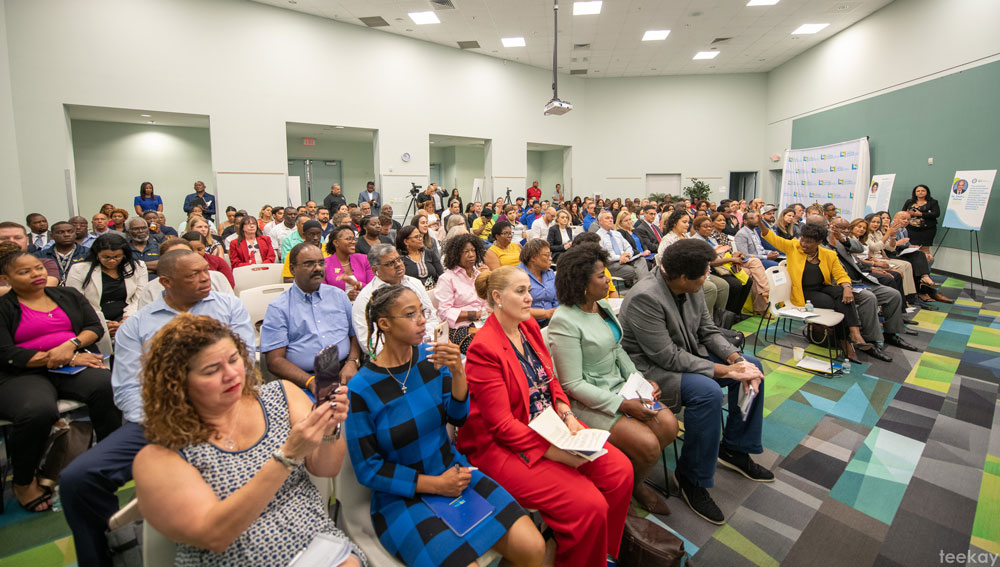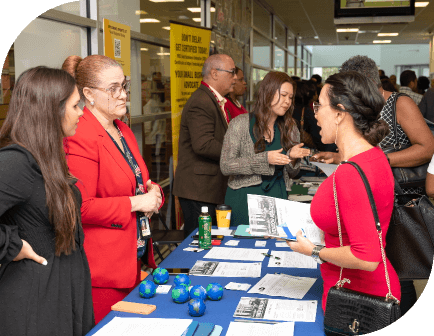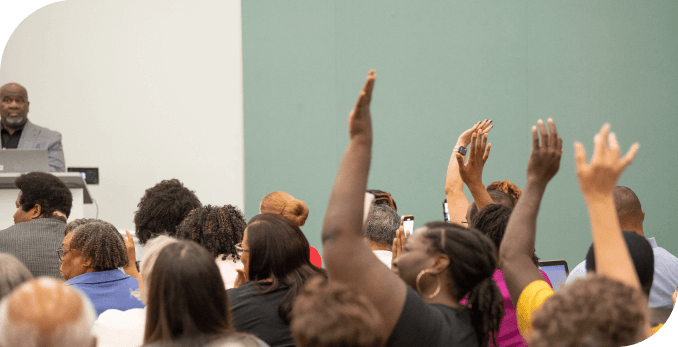In South Florida, Across Miami-Dade and Broward Counties Alone, SFAA Marketplace Members Spend $10 Billion a Year In Procuring Goods and Services
Our Work

The South Florida Anchor Alliance (SFAA), an initiative of Health Foundation of South Florida, is a collaborative of 20 regional institutions, including hospitals and healthcare systems, education enterprises, and municipalities that joined forces in 2019 to create a more inclusive South Florida economy through collective equitable procurement and workforce development initiatives. SFAA is a key pillar to advance the Health Foundation’s strategy to address and positively impact the social and economic disparities that affect community health and well-being.


Equitable Procurement
10+
Billion
GOODS & SERVICES
INCLUSIVE, LOCAL PURCHASING
BUILDING CAPABILITIES, CREATING CONNECTIONS
- Creating a thriving local business community
- Reducing barriers for local & diverse vendors
- Creating more efficient & resilient supply chains
- Aligning diversity & community benefit priorities
- Increasing contracting opportunities
WORKFORCE DEVELOPMENT

192,500*
EMPLOYEES
*as of 2022
HIRING & WORKFORCE DEVELOPMENT
LEVELING INEQUITIES THROUGH LOCAL HIRING
- Building an inclusive, local hiring pipeline
- Preparing residents for high-demand jobs
- Creating career pathways
- Reducing recruitment expenses
- Increasing wages for South Floridians

Read our Blueprint for Action
SOUTH FLORIDA ANCHOR ALLIANCE MEMBERS WILL COLLECTIVELY PRIORITIZE THE ESTABLISHMENT OF AN INCLUSIVE LOCAL ECONOMY BY:
- Developing, coordinating, expanding and deepening collaborative supplier diversity efforts to increase opportunities for local, small and minority-owned businesses.
- Developing, coordinating, expanding and deepening collaborative workforce development efforts for local minority residents.
- Sharing best practices among anchor alliance members and collectively sharing efforts with other communities.
Miami Dade
MIAMI-DADE COUNTY
Equitable Procurement
Policy & Procedures
Implement policy and procedures based upon best practices to increase local vendor engagement with participating anchors.
Implement policy and procedures based upon best practices to increase small business engagement with participating anchors.
Implement policy and procedures based upon best practices to increase minority owned business engagement with participating anchors.
ACTIVITIES/STRATEGIES
Review national best practices/recommendations related to increasing local, small business and/or minority-owned business engagement.
Share, review and compare participating anchors’ policies and procedures to learn of different approaches and best practices.
Develop an informational tool for vendors to better understand each anchor agency’s policies and processes.
Define and adopt agreed upon local standardized definitions and principles based upon anchor members’ policy and procedures best practices’ review.
Identify key administrative actions to collectively review and prioritize including, but not limited to:
- Prompt Payment Procedures
- Pre-qualified vendor selection process based upon ready, willing and available criteria, and decision making process for awards from pre-qualified vendor pool.
Participating anchors develop a unified state legislative platform reflecting recommendations supporting participating anchors’ supplier diversity priorities.
Certification & Registration
Implement vendor registration and certification processes that will eliminate barriers and increase the pool of certified firms (small and/ or minority-owned) for participating anchors.
ACTIVITIES/STRATEGIES
Review and assess national best practice recommendations related to vendor registration and certification processes.
Share, review and compare participating anchors’ vendor registration and certification process to learn of different local approaches and best practices.
Develop an informational tool for vendors to better understand each anchor agency’s vendor registration and certification processes.
Assess current certification reciprocity agreements and terms of established agreements among participating anchors; identify opportunities to increase reciprocity agreements and proceed in negotiating additional reciprocity agreements as appropriate.
Research and assess current and/or new products and systems that would streamline online vendor registration and certification process among participating anchors. Develop workplan to proceed with streamlining registration and certification process for participating anchors.
Establish a SFAA standing working group of procurement and supplier diversity leaders that meet regularly to reflect and improve upon collaborative recommendations.
Outreach, Engagement & Matchmaking
Increase identification and participation of local, small and/or minority-owned businesses through collaborative targeted outreach and engagement activities.
Increase awareness and engagement opportunities for local, small and/or minority-owned businesses through collaborative targeted informational and educational activities.
Increase local, small and minority-owned business contracting opportunities with participating anchor organizations by implementing matchmaking/ networking activities.
ACTIVITIES/STRATEGIES
Review and assess current outreach and engagement event calendars of all participating anchor organizations. Create a centralized communication strategy to consistently share information with local, small and minority-owned vendors (i.e. website, newsletter, coordinated information sharing)
Establish priorities for outreach and engagement activities by anchor organization (i.e. geographical-focused, industry-focused, supplier diversity-focused, currently non-registered or non-certified firms). Determine collaboration and coordination opportunities among participating anchors based upon identified priorities with the intent to maximize economies of scale (i.e. institutional savings and expansion of overall efforts). Develop calendar of collaborative events/activities.
Review and assess national best practice recommendations related to sharing business opportunities with local, small and/or minority vendors.
Integrate the Advancing Cities Small Business Advisory Council (as coordinated by The Miami Foundation) recommendations and feedback to inform outreach and engagement strategies.
Share, review and compare participating anchors’ current practices related to sharing business opportunities with local, small and/or minority vendors
Determine recommendations to streamline processes related to advertising of business opportunities among participating anchors (i.e. utilization of common online portal to share opportunities with registered/certified vendors)
Establish a business networking program inclusive of networking among local, small and/or minority-owned businesses based upon industry; coordinate match making opportunities with larger business based upon partnering opportunities by industry.
Capacity Building, Technical Assistance/Training, Financial Capacity Support
Increase internal staff understanding and awareness (of participating anchors) of the needs and strategies to engage local, small and minority- owned businesses.
Increase awards to local, small and/or minority-owned business that participate in capacity building, technical assistance/training and/or financial capacity support programs.
ACTIVITIES/STRATEGIES
Internal Capacity Building
Review and assess national best practice recommendations related to staff professional development to increase supplier diversity goals.
Share, review and compare participating anchors’ professional development activities related to supplier diversity principles and goals inclusive of engagement, bidding process, and post-bid follow- up.
Define professional development priorities and content to implement with participating anchor procurement staff with a focus on internal staff strengthening appropriate vendor follow up and evaluation of vendors.
External Capacity Building
Assess and identify gaps in availability to meet the anchor business/contracting needs. Within the assessment process, integrate work already completed by participating anchors (i.e. F.I.U.’s comprehensive survey process that led to refined capacity building strategies) and regular data collection processes that inform content and delivery methods) Based upon those gaps, develop and/or build upon current specialized incubator(s) across anchors for identified industries.
Assess and identify needs of small and minority-owned businesses. Based upon this assessment:
- Develop a course/program on how to do business with participating anchor organizations and/or build/expand upon current 6-week training program made available through M- DCPS.
- Engage with a working group of participating anchors leaders and/or an external consultant to coach small and minority-owned businesses on how to do business with participating anchors. Considerations need to be made for scaling of strategy.
- Assess current bonding capacity, financial grant programs, and financing opportunities to support the growth of local, small and/or minority-owned businesses.
- Identify key local best practices to highlight important stakeholder partners to collaborate in the development of new financial support strategies.
- Expand current local best practices and/or develop innovative new approaches to investing in the growth of small and minority owned businesses.
- Connect with existing technical assistance and financial assistance organization, such as the Florida State MSDC, SBDC, SBA, SCORE, etc.
WORKFORCE DEVELOPMENT
Anchor Workforce Needs
Create workforce development strategy based upon anchor workforce pipeline needs to increase employment opportunities in identified zip codes.
ACTIVITIES/STRATEGIES
Administer a SFAA developed survey tool to identify the general workforce needs and gaps in existing workforce pipelines of participating anchor organizations. Survey will include requests for job descriptions (with minimum qualifications) for:
- Hard to fill positions (including jobs where anchors had to import from outside of South Florida)
- Positions accessible to community
- Special project positions and high turnover positions
Survey will also request (if the anchor elects to provide) the organization’s minimum wage policies, succession planning policies/procedures related to positions hardest to fill, and an inventory of all current local upskilling programs (including those offering stackable credentials, industry certifications, etc).
Once assessment is completed, identify the top five professional and technical needs from participating anchors; and identify educational and nonprofit partners that can build and/or support the expansion of pipeline program development.
Develop and implement business plan with identified partners to address anchor prioritized workforce pipeline (based upon identified short and long-term goals).
Ensure that SFAA workforce plan complements and is integrated within current local workforce development strategies being led by partnering organizations including Advancing Cities partners. Plan should include the identification of the specific positions and where the jobs actually exist (geographic inventory).
Local Business Needs
Create workforce development resources for small and minority owned businesses to strengthen capacity to do business with participating anchors.
ACTIVITIES/STRATEGIES
In collaboration with the SFAA Supplier Diversity Working Group and the Advancing Cities partners, assess small and minority-owned hiring needs with a focus on entry level positions.
Identify current internship, apprenticeship, and training programs for industries prioritized through assessment process with a focus on fast- tracking credentialing and hiring.
Collaborate with SFAA Supplier Diversity working group to support capacity building strategy to train and support new/ current employees in the development of “Power Skill” (soft skills) Training of small and minority-owned businesses.
Develop a cooperative purchasing program for small and minority-owned businesses to buy into group health, retirement and other benefits in collaboration with the Advancing Cities Partners.
Recruitment
Implement recruitment strategies to increase anchor hiring of special populations in targeted zip codes. Implement recruitment strategies to invest and strengthen retention of local talent.
ACTIVITIES/STRATEGIES
Develop a SFAA marketing and awareness plan including hiring events to provide exposure to the knowledge of anchor employment opportunities in identified zip codes with a focus on youth and adult engagement (and reengagement). Grassroots engagement strategies should be considered for the needs of the following special populations:
- Out of School youth
- Students in foster care, students who are homeless, students of incarcerated parents and unaccompanied minors
- Veterans
- Reentry populations
- Exceptional Needs
- Immigrants (inclusive of multiple languages)
- Seniors citizens
Develop campaign to educate identified neighborhoods and special populations regarding basic qualifications/ background check requirements for anchor employment opportunities (and possible alternate routes for hiring developed by participating anchors).
Leveraging the principles of the Talent Development Network build participating anchors’ talent pathways for identified job opportunities through the development and recruitment of local talent. This would include MDCPS internships (summer and year-long), participating college/university internships, pre-apprentice and apprenticeship programs (with South Florida Career Source) and part-time employment transitions into full time employment.
Pilot a workforce portal as funded and led by the Advancing Cities grant a nd led by the City of Miami to complement and track recruitment, education, and hiring of participants.
Training, Education & Hiring Programs
Develop and implement training/education programs for anchor workforce pipelines to increase hiring in identified zip codes.
ACTIVITIES/STRATEGIES
Inventory existing education, training and hiring programs that address anchor workforce pipeline priorities. Integrate best practices and lessons learned from the Miami Community Ventures lead by the Beacon Council of Miami-Dade.
Build upon the Academic Leaders Council’s Course Catalogue of Academic Offerings inclusive of upskilling, workforce, certification programs, etc. related to identified prioritized pipelines. Gaps in offerings will be identified and a workplan will be developed to address the gaps.
This content should be the basis of information that would be part of a marketing campaign for career counselors.
Develop hiring incentive programs for anchor workforce pipeline priorities including housing policies and employee policies regarding loan forgiveness and/or educational benefits.
Broward
Broward COUNTY
SUPPLIER DIVERSITY
Policy & Procedures
Implement policy and procedures based upon best practices to increase local vendor engagement with participating anchors.
Implement policy and procedures based upon best practices to increase small business engagement with participating anchors.
Implement policy and procedures based upon best practices to increase women and/or minority-owned business engagement with participating anchors.
ACTIVITIES/STRATEGIES
Review national best practices/recommendations related to increasing local, small business, women and/or minority-owned business engagement.
Share, review and compare participating anchors’ policies and procedures to learn of different approaches and best practices.
To expand participation and engagement of additional anchors, integrate municipal engagement through the Prosperity Broward and Broward Up formal agreements as appropriate.
Develop an informational tool for vendors to better understand each anchor agency’s policies and processes.
Define and adopt agreed upon local standardized definitions and principles based upon SFAA anchor members’ policy and procedures best practices’ review.
Based upon best practice review, identify key administrative actions to collectively review and prioritize procedural recommendations for implementation.
Utilize Group Purchasing Organization (GPO) principles to frame new approach for procedures focused on the engagement of local, small and/or minority-owned business.
Certification & Registration
Implement vendor registration and certification processes that will eliminate barriers and increase the pool of certified firms (small and/ or minority-owned) for participating anchors.
ACTIVITIES/STRATEGIES
Review and assess national best practice recommendations related to vendor registration and certification processes. Share, review and compare participating anchors’ vendor registration and certification process to learn of different local approaches and best practices.
Develop an informational tool for vendors to better understand each anchor agency’s vendor registration and certification processes.
Develop an educational campaign across participating anchor institutions to explain the value of getting certified.
Research and assess current and/or new products and systems that would streamline online vendor registration and certification process among participating anchors.
Develop workplan to proceed with streamlining registration and certification process for participating anchors. Establish a SFAA standing working group of procurement and supplier diversity leaders that meet regularly to reflect and improve upon collaborative recommendations.
Outreach, Engagement & Matchmaking
Increase identification and participation of local, small and/or minority-owned businesses through collaborative targeted outreach and engagement activities.
Increase awareness and engagement of local, small and/or minority-owned businesses through collaborative targeted informational and educational activities.
Increase local, small and minority-owned business contracting opportunities with participating anchor organizations by implementing strategies that share potential bids/ procurement opportunities across anchors.
ACTIVITIES/STRATEGIES
Assess current outreach and engagement calendars of all participating anchor organizations. Create a centralized communication strategy to consistently share information with local, small and minority-owned vendors (i.e. website, newsletter, coordinated information sharing)
Establish priorities for outreach and engagement activities by anchor organization (i.e. geographical-focused, industry-focused, supplier diversity-focused, currently non-registered or non-certified firms). Determine collaboration and coordination opportunities among participating anchors based upon identified priorities with the intent to maximize economies of scale (i.e. institutional savings and expansion of overall efforts). These efforts should be done in partnerships with non-profits, cities, chambers, economic development organizations. Integrate these collaborative events/activities in the centralized branding and communication strategy.
Review and assess national best practice recommendations related to sharing business opportunities with local, small and/or minority vendors.
Share, review and compare participating anchors’ current practices related to sharing business opportunities with local, small and/or minority vendors
Determine recommendations to streamline processes related to advertising of business opportunities among participating anchors (i.e. utilization of unified online portal to share opportunities with registered and/or certified vendors).
Establish a local, small and/or minority-owned business networking program inclusive of networking among local, small and/or minority-owned businesses. The networking program would focus on building opportunities in a variety of industries including construction, goods and professional services.
Develop internal professional development opportunities for anchor staff and board leadership to ensure a long term sustainability of the SFAA’s priorities.
Capacity Building, Technical Assistance/Training, Financial Capacity Support
Increase awards to local, small and/or minority-owned business that participate in capacity building, technical assistance/training and/or financial capacity support programs.
ACTIVITIES/STRATEGIES
Internal Capacity Building
Review and assess national best practice recommendations related to staff professional development to increase supplier diversity goals.
Develop an internal campaign prioritizing supplier diversity.
Share, review and compare participating anchors’ professional development activities related to supplier diversity principles and goals inclusive of engagement, bidding process, and post-bid follow-up.
Define professional development priorities and content to implement with participating anchor procurement staff with a focus on internal staff strengthening appropriate vendor follow up and evaluation of vendors.
External Capacity Building
Develop a unified assessment tool for all participating anchor organizations. The assessment tool will determine the information and needs of local, small and minority-owned businesses.
Through the use of the co-developed assessment tool, identify needs of small and minority-owned businesses. Based upon results:
Develop a course/program on how to do business with participating anchor organizations and/or build/expand upon current training programs made available through participating anchors and/or non-profit partners.
In partnership with local non-profits, develop a course/ program to develop knowledge and skills linked to business operations.
Engage with a working group of participating anchors leaders and/or external consultant to coach small and minority-owned business on how to do business with participating anchors.
Through the assessment tool, identify local, small and minority owned businesses financial needs/challenges. The information gathered, should be utilized to build a menu of financial support offerings to address business’s bonding capacity, expand financing opportunities and financial support grant programs. Establish a mentor protégé program for small and minority-owned businesses for a variety of industries including construction, goods and professional services.
Use of and Sharing of Data
Streamline coordination of data processes and reporting to increase track progress.
ACTIVITIES/STRATEGIES
Assess how data is collected across participating anchor organizations and determine which organizations share similar data collection protocols.
Establish an ongoing SFAA Think Tank to meet regularly to review and develop dashboard metrics for the SFAA. The group will also discuss best practices and challenges.
Build a bidding portal and a contracts repository for participating anchors with non-proprietary information to build on Cooperative Purchasing Initiatives established within government guidelines to include bids, contracts, procurement programs, and other resources (policies/procedures/ commodity codes). This can be framed around local, small and minority-owned vendor contracting opportunities.
Establish a working group to establish data baselines and measurable benchmark outcomes for individual anchors and the SFAA as a whole ensuring that returns on investments are quantifiable. The SFAA will develop an annual progress report.
WORKFORCE DEVELOPMENT
Anchor Workforce Needs
Create workforce development strategy based upon anchor workforce pipeline needs to increase employment opportunities in identified zip codes.
ACTIVITIES/STRATEGIES
Administer a SFAA developed survey tool to identify the general workforce needs and gaps in existing workforce pipelines of participating anchor organizations.
Complementing Broward Up and Prosperity Broward’s priorities and strategies, identify key zip codes to implement SFAA workforce development strategies. Establish baseline employment/workforce data from identified zip codes.
Integrate municipal engagement through the Prosperity Broward and Broward Up formal agreements as appropriate.
Identify top five professional and technical needs from participating anchors; and educational and nonprofit partners that can build and/or expand pipeline program development.
Develop and implement business plan to address SFAA workforce pipeline prioritized pathways (based upon short and long-term goals).
Ensure that SFAA business plan complements and is integrated within current workforce development strategies being led by partnering organizations.
Collaborate with SFAA Supplier Diversity working group to support capacity building strategy to develop workforce pipeline for small businesses to train and support new/current employees related to construction fields.
Develop summer internship strategy for youth and larger employers with a focus on participating anchors.
Recruitment
Implement recruitment strategies to increase anchor hiring of special populations in targeted zip codes.
Implement support strategies to scaffold special populations for opportunities of gainful employment.
Implement recruitment strategies with higher education institutions including Historical Black Universities.
ACTIVITIES/STRATEGIES
Develop a SFAA marketing and awareness plan to provide exposure to knowledge of anchor employment opportunities in identified zip codes with a focus on varied strategies for different targeted audiences – youth and adult engagement (and reengagement). Strategies should be tailored for the needs of each special population. Campaign should also create an awareness of changes to workforce needs and refinement of opportunities. Efforts should also build upon and leverage resources including BCPS’s BRACE advisors.
Identify the minimum requirements and certification for anchor pipeline needs. Work with Broward County Public Schools and other education and nonprofit partners provide career laddering/pathways.
Develop a more intensive model for special populations inclusive of case management/coaching. Develop a GED completion support strategy with anchor partners to best prepare those that are recruited. Support strategy would focus on special populations including:
Reentry populations – Find a way back
Exceptional Needs including youth aging out of public school programs.
Immigrants (inclusive of multiple languages)
Out-of-School Youth
In collaboration with educational institutions including historically black universities, provide a pool of resources/ funding for Out-of-School youth with exceptional needs for anchor-based GED/employer model that links to industry certification, job training and employment.
Training, Education & Hiring Programs
Develop and implement training/education programs for anchor workforce pipelines to increase hiring in identified zip codes in collaboration with school district, local colleges and universities including historically black universities.
ACTIVITIES/STRATEGIES
Inventory existing education, training and hiring programs for anchor workforce pipeline opportunities in collaboration with the school district, local colleges and universities and historically black universities. This work will be in collaboration and in alignment with Prosperity Broward and Broward Up including current technical repositories of information.
Each anchor will generate an initial business plan with appropriate education partners to implement their needs for workforce pipeline needs. Collectively, participating anchors will build multiple pathways to support attainment of employment requisites (i.e. dual enrollment, dual certification, internships, scholarships, pre-apprenticeship and apprenticeship, use of career counselors). Business plans will integrate:
Professional development of anchor HR development teams regarding economic cliff of identified zip codes and special populations. Professional development will focus on challenging the workforce culture to support solution focused pathways.
Consider community assets for site-based training to offset costs.
Strategies and partnerships that can be integrated within Broward County Public Schools’ alternative high schools.
Once business plans are completed, anchors will streamline efforts to collaboratively present to target populations through a SFAA marketing and outreach strategy. Presentations from workforce, education and training institutions will be packaged inclusive of requirements, salaries, opportunities, etc. that partnering organizations can use for recruitment and engagement.
Local Business Needs
Streamline coordination of data processes and reporting of progress.
ACTIVITIES/STRATEGIES
Develop a shared data portal to capture participation and placements related to SFAA collaboration in alignment with Miami-Dade cohort’s portal to complement and track recruitment, education and hiring of participants.
